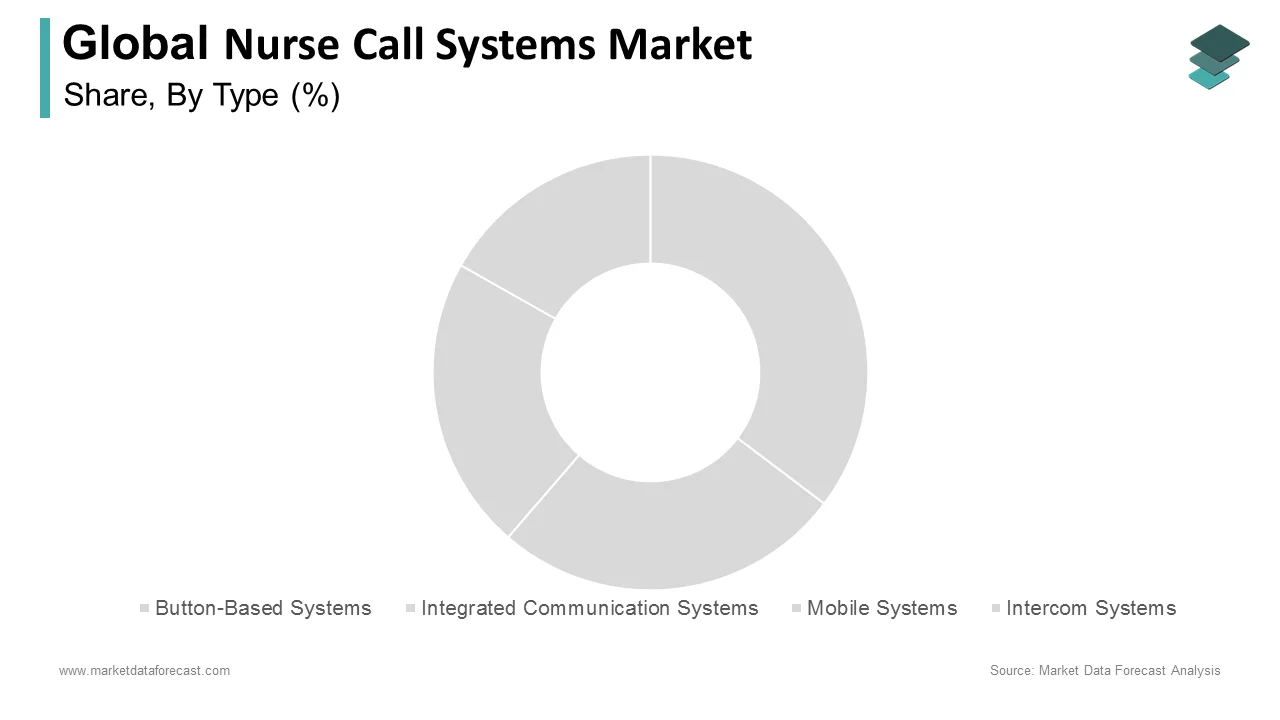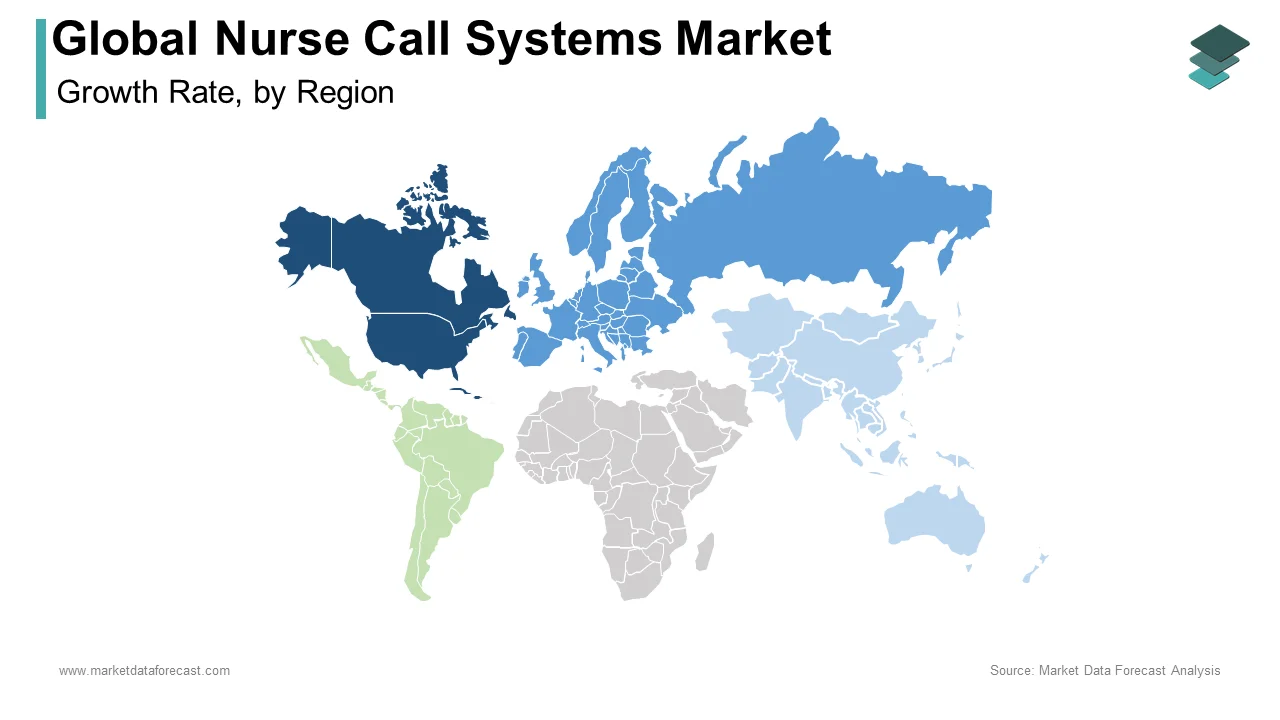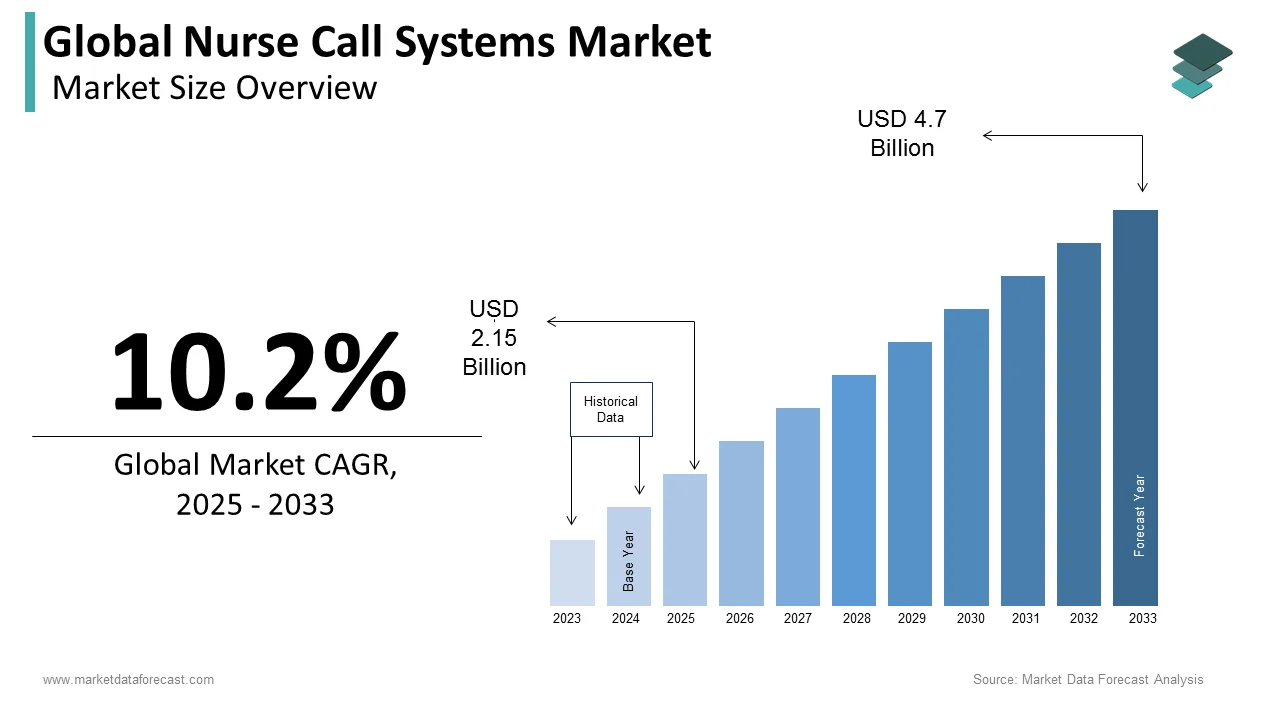Global Nurse Call Systems Market Size, Share, Trends & Growth Forecast Report By Type (Button-Based Systems, Integrated Communication Systems, Mobile Systems and Intercom Systems), Technology (Wired and Wireless), Application, End-User and Region (North America, Europe, Asia-Pacific, Latin America, Middle East and Africa), Industry Analysis From 2025 To 2033.
Global Nurse Call Systems Market Size
The global nurse call systems market was worth US$ 1.95 billion in 2024 and is anticipated to reach a valuation of US$ 4.7 billion by 2033 from US$ 2.15 billion in 2025, and it is predicted to register a CAGR of 10.2% during the forecast period 2025-2033.
MARKET DRIVERS
The growing demand for people for quality patient care is majorly driving the nurse call systems market growth.
Nurse call systems act like a bridge between patients and healthcare providers by filling the communication gaps. In addition, these devices provide faster response times and improve efficiency in healthcare facilities. In recent years, nurse call systems have gained recognition as an essential tool in hospitals as it eases the pressure on healthcare providers to offer improved patient care at a reduced cost. In addition, the demand for quality healthcare services is growing significantly due to the increasing aging population and the rising prevalence of chronic diseases. In situations like these, nurse call systems are doing a great favor to healthcare providers in managing the growing demand for quality healthcare services by streamlining the communication channels and improving efficiency.
The growing aging population worldwide is fuelling the growth of the nurse call systems market.
As per the statistics published by the World Health Organization (WHO), the population of 60 years old and more reached 1 billion in 2020, which is expected to grow to 1.4 billion by 2030. Therefore, the healthcare needs of people increase with age and people who are aged are more likely to be prone to various chronic diseases and age-related diseases and require continuous monitoring of health and regular care. Using nurse call systems, patients can call for help whenever required; hence these devices play a major role in providing a safe and secure environment for older patients.
The increasing healthcare expenditure is favoring the nurse call systems market growth.
Healthcare expenditure in countries such as the United States has continuously grown over the last few years. As per the data published by the Centers for Medicare & Medicaid Services, the national health expenditure of the U.S. was valued at USD 4.3 Trillion in 2022. Healthcare expenditure has also grown gradually in the European region over time. The healthcare expenditure in the European Union was estimated to be 2 trillion Euros in 2019, which was a 2.5% increase from 2018. Due to the continuous growth in healthcare expenditure, Healthcare providers are always looking for ways to deliver improved patient care at a lower cost. By using nurse call systems, healthcare providers can provide quality healthcare delivery at lower costs, as these devices offer reduced response times and improved workflow efficiency. Likewise, the growing emphasis of healthcare providers to offer high patient safety and patient satisfaction is resulting in the growing usage of nurse call systems and boosting the market growth.
Technological advancements are favoring the growth of the nurse call systems market.
The key market participants have added features such as wireless connectivity, voice recognition, mobile integration, and real-time monitoring to the nurse call systems by using the latest technologies. These developments have made communication effective and helped deliver better quality patient care. The increasing number of initiatives from various governments to develop the healthcare infrastructure in developing and underdeveloped countries is fuelling the market’s growth rate. The governments of multiple countries have been investing significant amounts in developing healthcare infrastructure such as constructing new hospitals, upgrading the capabilities of existing healthcare facilities, and implementing healthcare IT solutions. Implementing healthcare IT solutions in the healthcare systems is a prime focus of governments of many countries. Nurse call systems are one of the essential components in healthcare IT solutions as they deliver reduced response times, improve communication and collaboration among healthcare staff and deliver quality patient care.
MARKET RESTRAINTS
However, the high costs associated with adopting the nurse call system are predicted to showcase a negative impact on the adoption and the growth rate of the market. In addition, the efficacy of the nurse call system depends on the level of hardware, software, and staff training at the healthcare facility. As a result, final patients need to invest extensively in these areas to incorporate and use the nurse call systems effectively. These are some of the key factors that restrict the nurse call system market growth.
REPORT COVERAGE
|
REPORT METRIC |
DETAILS |
|
Market Size Available |
2024 to 2033 |
|
Base Year |
2024 |
|
Forecast Period |
2025 to 2033 |
|
CAGR |
10.2% |
|
Segments Covered |
By Type, Technology, Application, End-User, and Region. |
|
Various Analyses Covered |
Global, Regional, and country-level analysis; Segment-Level Analysis, DROC; PESTLE Analysis; Porter’s Five Forces Analysis, Competitive Landscape; Analyst Overview of Investment Opportunities |
|
Regions Covered |
North America, Europe, APAC, Latin America, Middle East & Africa |
|
Market Leaders Profiled |
Rauland-Borg Corporation, Hill-Rom Holdings, Inc., Ascom, Johnson Controls International Plc, Ackermann (By Honeywell), Siemens AG, Jeron Electronic Systems, Inc., Azure Healthcare Limited, Schrack Seconet AG, Intercall Systems, Inc., Tektone Sound & Signal Mfg., Inc., Cornell Communications, Stanley Healthcare, Courtney Throne and Tunstall Group, and Others. |
SEGMENTAL ANALYSIS
By Type Insights

The button-based systems segment held the major share of the global nurse call systems market in 2024 and is considered the most lucrative segment. During the forecast period, the domination of the button-based systems segment is likely to continue. The growing adoption of button-based systems drives the segment's growth, the adoption of technological developments to manufacture effective button-based systems, the increasing aging population, and the convenience and user-friendliness of button-based systems. On the other hand, the integrated communication systems segment captured the second largest share of the worldwide market in 2024 and is expected to grow at a notable CAGR during the forecast period owing to the integration capabilities. In addition, the advantages of integrated communication systems such as two-way voice communication, messaging, and mobile notifications, further contribute to the segment's growth rate.
By Technology Insights
The wireless communication segment is anticipated to hold the major share of the worldwide market during the forecast period. The flexibility and mobility associated with wireless nurse call systems are one of the primary reasons behind the greater adoption of these devices compared to wired nurse call systems. Wireless devices are much more convenient for patients. In addition, the installation and maintenance of wireless systems are much easier compared to wired systems and due to this, many healthcare organizations prefer wireless systems over wired systems. Furthermore, the advantages of wireless systems such as two-way voice communication, mobile notifications, and integration with other healthcare systems, drive segmental growth. On the other hand, the wired segment also had a considerable share of the worldwide market in 2024. The cost-effectiveness and reliability associated with wired nurse call systems to drive segmental growth. In addition, wired systems are a good option for healthcare facilities with limited funding to invest in healthcare IT solutions.
By Application Insights
The alarms and communication segment occupied the largest share of the global nurse call systems market in 2024. Furthermore, the segment’s domination is likely to continue during the forecast period. The segment's growth is majorly driven by the increasing demand forsophisticated communication systems, growing emphasis on patient safety, and improved overall efficiency of healthcare facilities. Owing to its crucial role in streamlining the patient, nurse, and caregivers' communication and providing high patient safety, the alarms and communication segment is expected to experience a healthy growth rate during the forecast period.
By End User Insights
The hospital segment had the largest share of the global nurse call systems market in 2024 as they were the largest consumers of nurse call systems. The hospital segment is also expected to continue to be the major segment in the global market during the forecast period. The growing number of patients visiting hospitals for continuous care is one of the major factors contributing to segmental growth. As a result, hospitals need nurse call systems to deliver timely patient care. In addition, the rising adoption of healthcare IT solutions among hospitals is further propelling the segment’s growth rate.
REGIONAL ANALYSIS

Geographically, the North American region held the largest share of the global market in 2024 and the domination of the North American region in the worldwide market is anticipated to continue throughout the forecast period. Factors such as growing healthcare expenditure, rapid adoption of technological advancements and the rising aging population primarily propel the North American market growth. The growing patient population of chronic diseases, increasing need for quality healthcare services, the presence of several international market participants, favorable reimbursement policies, initiatives of North American governments to promote the adoption of technologically advanced healthcare systems, aging baby boomer population and their increasing healthcare needs further fuel the growth rate of the North American market. In this region, the U.S. nurse call systems market is anticipated to grow aggressively during the forecast period. Closely 85% of the North American market share was accounted for by the U.S. in 2024 and the domination of the U.S. is anticipated to continue during the forecast period owing to the growing aging population and increasing healthcare expenditure.
The Europe nurse call systems market had a substantial share of the worldwide market in 2024 and is estimated to grow at a promising CAGR during the forecast period. The rising demand for better patient care, a growing number of hospitals and nursing homes, strict government regulations on healthcare systems and medical devices, growing adoption of wireless and mobile nurse call systems, the rising trend towards home-based healthcare services and the growing number of government initiatives to promote healthcare spending primarily boost the growth rate of the European market. Germany captured the leading share of the European market in 2024 and is estimated to grow at a healthy CAGR during the forecast period.
During the forecast period, the nurse call systems market in the Asia-Pacific region is predicted to grow at the fastest CAGR owing to the growing emphasis of international market participants to capture the potential of APAC, increasing investments by the governments of APAC countries to improve the healthcare infrastructure. In addition, factors such as the rapidly growing geriatric population and their increasing healthcare needs, the growing trend towards medical tourism in countries like India, Thailand and Singapore, growing number of private hospitals and nursing homes contribute to the regional market growth. Furthermore, the growing demand for low-cost healthcare solutions in developing countries and the rising adoption of telehealth and remote patient monitoring technologies fuel the growth rate of the APAC market. Japan was the biggest regional segment in APAC in 2024 and the same is expected to continue during the forecast period.
The Latin American nurse call systems market is estimated to hold a considerable share of the global market during the forecast period. The growing prevalence of infectious diseases, increasing need for better healthcare infrastructure, rising number of initiatives from the Latin American governments to promote healthcare spending and rising trend towards medical tourism in countries like Brazil, Mexico, and Costa Rica majorly propel the Latin American market growth. Brazil accounted for the leading share of the Latin American market in 2024 among all the countries of the region.
The nurse call systems market in the Middle East and Africa is projected to grow at a steady CAGR during the forecast period. Factors the growing patient population with chronic diseases, the growing aging population and the presence of several established hospitals and nursing homes in some countries contribute to the regional market growth.
KEY MARKET PLAYERS
Rauland-Borg Corporation, Hill-Rom Holdings, Inc., Ascom, Johnson Controls International Plc, Ackermann (By Honeywell), Siemens AG, Jeron Electronic Systems, Inc., Azure Healthcare Limited, Schrack Seconet AG, Intercall Systems, Inc., Tektone Sound & Signal Mfg., Inc., Cornell Communications, Stanley Healthcare, Courtney Throne and Tunstall Group are some of the key market participants dominating the global nurse call systems market.
MARKET RECENT DEVELOPMENTS
- In December 2019, Tunstall Carecom, a nurse call system, was launched in the UK by Tunstall Group.
- In February 2019, Myco 3 smartphone was launched by Ascom in Switzerland, further penetrating the nurse call system market with an integrated and advanced system.
- In February 2017, For USD 340 million, Rauland-Borg was acquired by AMETEInc. This helped Rauland-Boro capitalize on the resources provided by AMETEK in the dead expanding the offers and opportunities of both companies.
MARKET SEGMENTATION
This research report on the global nurse call systems market has been segmented and sub-segmented based on the type, technology, application, end-user, and region.
By Type
- Button-Based Systems
- Integrated Communication Systems
- Mobile Systems
- Intercom Systems
By Technology
- Wired communication
- Wireless communication
By Application
- Alarms & Communications
- Workflow Optimization
- Wanderer Control
- Fall Detection & Prevention
By End User
- Hospitals
- Long-term Care Facilities
- Clinics & Physician Offices
By Region
- North America
- Europe
- Asia Pacific
- Latin America
- Middle East and Africa
Frequently Asked Questions
Who are the leading players in the global nurse call systems market?
Companies such as Rauland-Borg Corporation, Hill-Rom Holdings, Inc., Ascom, Johnson Controls International Plc, Ackermann (By Honeywell), Siemens AG, Jeron Electronic Systems, Inc., Azure Healthcare Limited, Schrack Seconet AG, Intercall Systems, Inc., Tektone Sound & Signal Mfg., Inc., Cornell Communications, Stanley Healthcare, Courtney Throne and Tunstall Group are commanding the nurse call systems market and accounting the major share.
Does this report include the impact of COVID-19 on the nurse call systems market?
Yes, we have studied and included the COVID-19 impact on the global nurse call systems market in this report.
How much is the global nurse call systems market going to be worth by 2032?
By the end of 2033, the global nurse call systems market is expected to be valued at USD 4.7 billion.
Which geographical region led the nurse call systems market in 2024?
Geographically, the North American region behaved dominantly in the global nurse call systems market in 2024.
Related Reports
Access the study in MULTIPLE FORMATS
Purchase options starting from $ 2500
Didn’t find what you’re looking for?
TALK TO OUR ANALYST TEAM
Need something within your budget?
NO WORRIES! WE GOT YOU COVERED!
Call us on: +1 888 702 9696 (U.S Toll Free)
Write to us: [email protected]

